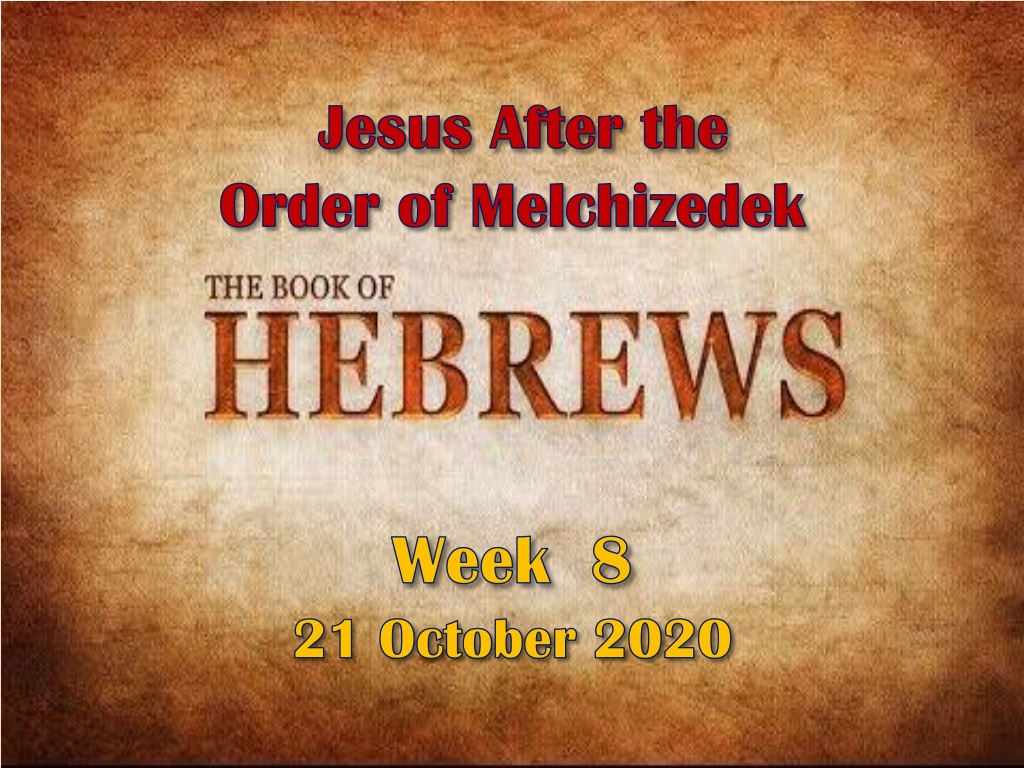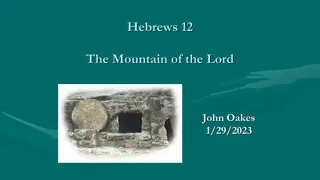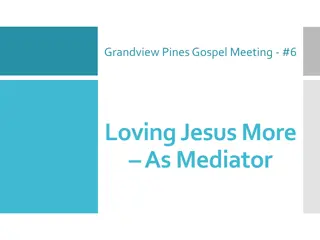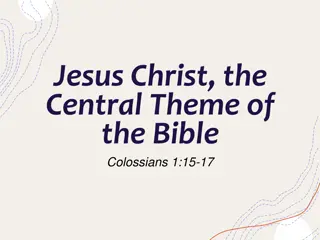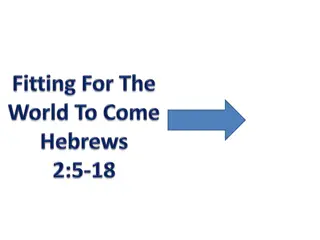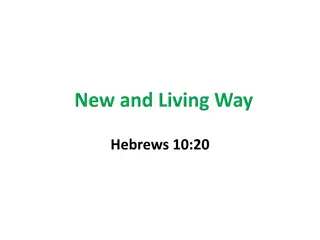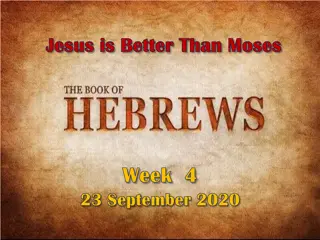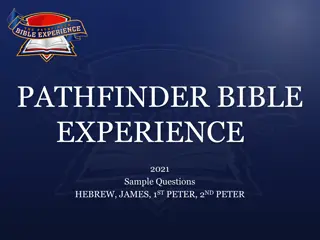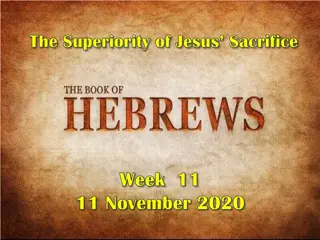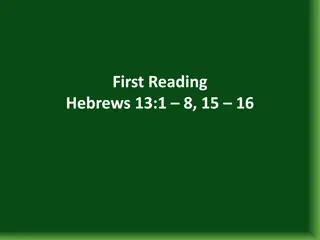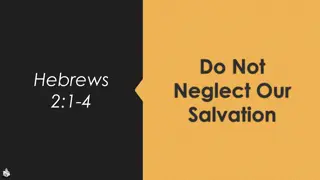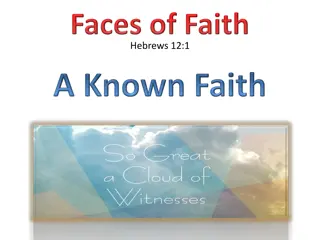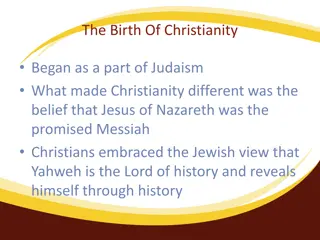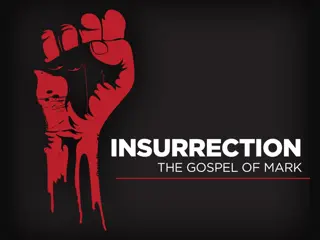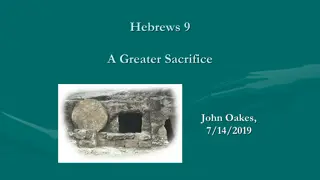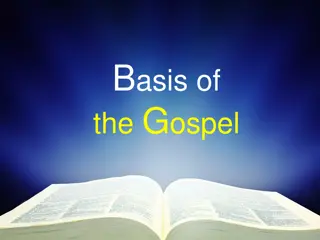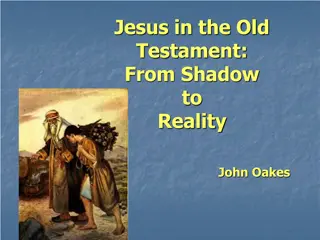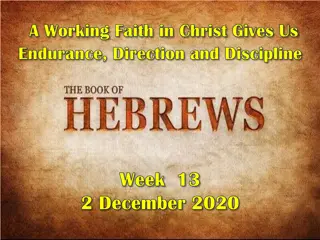Understanding Jesus After the Order of Melchizedek in the Book of Hebrews
The Book of Hebrews focuses on Jesus as the ultimate High Priest in the order of Melchizedek, surpassing prophets, angels, Moses, and Aaron. It explores the significance of this new priesthood, emphasizing Jesus as the central figure of the Old Testament and the fulfillment of God's promise. The chapters highlight warnings against spiritual drift, hardness of heart, and hindrances to growth, leading to a deep discussion on the superiority and necessity of Jesus as the High Priest after the order of Melchizedek.
Download Presentation

Please find below an Image/Link to download the presentation.
The content on the website is provided AS IS for your information and personal use only. It may not be sold, licensed, or shared on other websites without obtaining consent from the author. Download presentation by click this link. If you encounter any issues during the download, it is possible that the publisher has removed the file from their server.
E N D
Presentation Transcript
Jesus After the Jesus After the Order of Melchizedek Order of Melchizedek Week 8 Week 8 21 October 2020 21 October 2020
HEBREWS REVIEW Chapter 1: Jesus, Better than Prophets and Angels (1:1-14) Chapter 2: Jesus, Better than the Angels (2:1-18) Chapter 3: Jesus, Better than Moses (3:1-19) Chapter 4: Jesus, Better than Joshua (4:1-16) Chapter 5: Jesus, Better than Aaron as Priest (5:1-14) Chapter 6: Jesus, Press On To Maturity (6:1-20). THISLESSON . . . Chapter 7: Jesus, After the Order of Melchizedek (7:1-17).
HEBREWS REVIEW Warnings: In light of the disappointing and spiritually dangerous condition of the Hebrew Christians described thus far, Paul has provide three of the fivewarning in this book. 1st Pay attention lest you drift away (2:1-4), 2nd Beware of a harden heart (3:7-4:13), and 3rd Don t allow dullness of heart to hinder spiritual growth (5:11-6:20).
Chapter 7 Chapter 7
HEBREWS CHAPTER 7 Overview of Chapter 7: Resuming the discussion of Jesus as High Priest, the superiority of Melchizedek to Abraham and Levi is first demonstrated (1-10). Reasons are then given as to why a new priest after the order of Melchizedek was necessary, which also required a change in the Law (11-19). Finally, the greatness of Jesus as our new High Priest is explained (20-28).
HEBREWS CHAPTER 7 Discussion: The Book of Hebrews argues that Christ is the center and goal of Old Testament revelation whether in direct messianic prophecies, prophetic anticipation, or even foreshadowing figures, as in the case of the mysterious Melchizedek. Paul declares that with the coming of the Messiah, a whole new era has dawned, leaving the old system of Judaism in the past.
HEBREWS CHAPTER 7 Discussion: The mysterious figure Melchizedek is the point of reference for Paul s exposition in the first seventeen verses. Paul s key passage is Psalm 110:4 which he already quoted in Hebrews 5:6 to demonstrate that Christ is our heavenly High Priest. The Lord has sworn and will not change his mind, You are a priest forever according to the order of Melchizedek (Ps 110:4).
HEBREWS CHAPTER 7 Discussion: Paul begins to point out some similarities between Melchizedek in Genesis 14 and the person of Christ. What Melchizedek was in the biblical narrative, Christ is in His very nature. It s states that Melchizedek was made like the Son of God. That is, to make something resemble another thing. This doesn t mean that Melchizedek was in his nature the Son of God or that he was in his nature eternal, divine, angelic, or heavenly.
HEBREWS CHAPTER 7 Discussion: Rather, it means that Melchizedek displays some striking similaritiesthat serve as a type, foreshadowing, or illustration of the true eternal high priest, Jesus Christ. Paul explains how it is that Christ s Melchizedekian priesthood is superior to that of Aaron, which came later. Remember, this is the very same subject that Paul said was hard to explain to his dull to hear readers.
FIRST FIRST similarly, they are kings. The place called Salem later called Jerusalem. similarly, they are kings. The place called Salem later called Jerusalem. SECOND SECOND the name Melchizedek means king and righteousness. The name the name Melchizedek means king and righteousness. The name Salem means shalom, translated peace. Salem means shalom, translated peace. THIRD THIRD Melchizedek is introduced without mention of his parentage, ancestry, birth Melchizedek is introduced without mention of his parentage, ancestry, birth or death. He pronounced a priestly blessing over Abraham, who responded by giving or death. He pronounced a priestly blessing over Abraham, who responded by giving Melchizedek a tenth of the spoils of his recent battle. Melchizedek a tenth of the spoils of his recent battle.
HEBREWS CHAPTER 7 Discussion: Here, Paul argues that Melchizedek foreshadowed the coming of the Son of God. As such, David can later declare of the future Messiah, You are a priest forever according to the order of Melchizedek (Ps 110:4). Jesus was of the tribe of Judah ineligible to serve as priest on earth. Jesus priesthood was different. What Melchizedek was in the narrative, the Messiah is in the His nature Jesus is Priest and King, Righteousness and Peace incarnate, eternal in His deity, and ever able to serve as High Priest in heaven.
HEBREWS CHAPTER 7 Discussion: Here, Paul demonstrates that Melchizedek himself was greater even than Abraham, the founding father of the Hebrew people and original recipient of the foundational covenant (7:4). FIRST Abraham gave the priest one tenth ( tithe ) of all his spoils of war (Gen. 14:20). In the Law of Moses, the Levitical priesthood received tithes from the people of Israel the descendants of Abraham (7:5). Note: tithing predates the Mosaic Law.
HEBREWS CHAPTER 7 Discussion: SECOND Melchizedek blessed Abraham, the one who possessed the promises of God (7:6). In a formal Biblical blessing, the superior (greater)always blesses the inferior (lesser). Paul notes that such order of rank and propriety of blessing is without any dispute (7:7). The priest- king of Salem occupied a place of greater spiritual authority than Abraham: greater indicates a person of greater status, prominence, or rank.
HEBREWS CHAPTER 7 Discussion: By implication then, Melchizedek s priesthood was superior to the priesthood of the Levites, who were still in the loins of Abraham (7:10). Because Melchizedek is greater than the Levitical priests, Melchizedek s priesthood which existed long before the Law of Moses is greater than the Levitical priesthood established under Moses. Because the Messiah s priesthood is of the order of Melchizedek, the Messiah s priesthood is greater than the priesthood of the Levites under Mosaic Law.
HEBREWS CHAPTER 7 Discussion: What a powerful argument! Remember, the readers had been tempted to back away from their complete trust in the Messiah as their great High Priest and find significance again in the Levitical priesthood with its continual sacrifices and rituals. Paul states there is another priestly order superior to the Levitical line of Aaron. It was the order of Melchizedek, a king-priest who foreshadowed a still greater future King and Priest, Jesus Christ.
HEBREWS CHAPTER 7 Discussion: Paul quotes David that another priest was to rise who was not part of the order of Aaron (7:11), but shall be after the order of Melchizedek (Ps 110:4). There was obviously something the priesthood of Aaron couldn t accomplish perfection (7:11). Paul makes the obvious point that with the changing of the priesthood from Aaron to Melchizedek, there must also be changes regarding the Law of Moses (7:12).
HEBREWS CHAPTER 7 Discussion: The Levitical priesthood failed to give the believer direct access to God. The Law failed to bring maturity into the life of the believer. But where the old covenant failed, the new covenant succeeded. With Jesus Christ the promised Priest according to the order of Melchizedek came the assurance both of unhinderedaccess to God (4:14-16) and growth toward real spiritualmaturity (12:1-2).
HEBREWS CHAPTER 7 Discussion: Paul explains that Jesus Christ descended from the tribe of Judah rather than from the tribe of Levi. As such, Jesus stood outside the legal lineage for a priest under the Law of Moses (7:14). Jesus priesthood was of a completely different order. It was an eternal priesthoodbased on an indestructible (endless) life, foreshadowed by the mysterious Melchizedek (7:15-16).
HEBREWS CHAPTER 7 Discussion: Paul argues that on the other hand, the Law was set aside because of its weakness and uselessness at providing genuine access to God and means of spiritual growth . . . for the Law made nothing perfect (7:18-19). Knowing God and having personal access to Him are the hallmarks of true religion. Fallen humanity needs a reliable bridge to span the chasm that separates sinful humans from a holy, righteous God that bridge is Jesus Christ (1Tim. 2:5; John 14:6).
HEBREWS CHAPTER 7 Discussion: Note the following four comparisons . . . ONE Paul emphasizes the fact that Christ s Melchizedekian priesthood was established by a divine oath, as found in Psalm 110:4, (7:21). Because Christ is superior in His priesthood, those who place their trust in Him are guaranteed a better kind of salvation. Because Jesus lives forever, we will live forever (7:22).
HEBREWS CHAPTER 7 Discussion: Note the following four comparisons . . . TWO Paul declares that Jesus was the personal guarantee of a better covenant that could never expire (7:22). Jesus has become the guarantee of a covenantal arrangement superior to that of Moses (7:22).
HEBREWS CHAPTER 7 Discussion: Note the following four comparisons . . . THREE Paul declares that Jesus priestly ministry is permanent, because He conquered death and lives forever (7:24). We sinful mortals are in perpetual need of a mediating high priest; Christ is a perpetual, perfect High Priest (7:24).
HEBREWS CHAPTER 7 Discussion: Note the following four comparisons . . . FOUR Paul declares that Jesus ministry of heavenly intercession enables Him to provide eternal salvation to those who come to God through Him (7:25). What a great reminder of our eternal security in Jesus Christ. He is able to save totally, completely, and forever those who have placed their faith in Him (7:25).
HEBREWS CHAPTER 7 Discussion: Three additional reasons for Christ s superiority FIRST Jesus is superior because He is sinless (7:26). SECOND Jesus is superior because His sacrifice was offered once for all (7:27). THIRD Jesus is superior because He is the perfect, powerful Son of God (7:28).
HEBREWS CHAPTER 7 Points to Remember: The superiority of Melchizedek to Abraham and Levi (1-10). The change in the priesthood and the annulment of the law (11-19). The superiority of Jesus priesthood to the Levitical priesthood (20-28).
HEBREWS CHAPTER 7 Application of Chapter 7 [1] Change in the priesthood, change in the Law. When Christ took His position at the right hand of the Father to function in the role of the great High Priest, He came not to continue the OT Levitical priesthood, but He came as a priest according to the order of Melchizedek. Jesus uprooted the Law, which produced nofruit in the life of the believer. Whereas the Law was both weakandineffective, grace is both effective and filled with assurance.
HEBREWS CHAPTER 7 Application of Chapter 7 [2] Grace vs Law. We must never forget that it is grace, not Law, which enables us to draw near to God. Rigid rules provide no access to God; legalistic principles provide no security. Our security is in a Savior who has fulfilled the Law for us. Having fulfilled the Law including its need for perfect obedience and a perfect sacrifice for sin Christ has ushered in a new order based on the principle of grace.
HEBREWS CHAPTER 7 Application of Chapter 7 [3] Grace through faith, no works. Being right with God doesn t require us to work through a daunting list of dos and don ts or to turn to a priest (who is also sinful) for mediation. Rather, we turn to the great High Priest who is after the order of Melchizedek. Our High Priest is indestructible, lives permanently, and is able to do what no earthly priest could ever do.
HEBREWS CHAPTER 7 Application of Chapter 7 [4] A change for the better. Unlike the OT priesthood with its endless sacrifices, our High Priest (Jesus Christ), not only tells us we re weak and empty and in need of saving; He actually saves us, strengthens us, and fills us with His power to trust and obey Him. Apart from Christ, we can do nothing, but with Him, we can do all things. Thank God that with the changing of the priesthood, there has been a changing of the Law as well.
HEBREWS CHAPTER 7 Application of Chapter 7 [5] Christ, our permanent Bridge-maker. The idea of Christ as the Bridge between sinful humanity and our holy God has become a helpful way of thinking about the gospel of salvation. As a reminder for us as well as a motivator to share this simple good news with others, continue to view Christ as our permanent Bridge-maker.
HEBREWS CHAPTER 7 Application of Chapter 7 [6] Christ, our access to God. Since you have cross the chasm of sin over the Bridge of Christ, have you shared the good news with others? Have you taken the hand of an unbeliever who was stuck on the wrong side of the chasm and carefully walked them through God s plan of salvation through Jesus Christ (John 14:6).
NEXT CLASS 21 October 2020 Read before the next class in the KJV and Read before the next class in the KJV and in two other versions of the Bible, i.e., in two other versions of the Bible, i.e., NKJV, NRSV, NIV, CEV, etc NKJV, NRSV, NIV, CEV, etc Chapter 8:1 13
